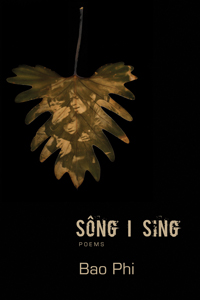
A Guest Post by Greg Choy
Sông I Sing by Bao Phi | Coffee House Press 2011 | $16

After reading Bao Phi’s remarkable collection of poems, Sông I Sing, I was reminded of an incident that occurred about ten years ago when I was an assistant professor at the University of Minnesota. I was attending a panel discussion at UMinn entitled, simply, “Asian American Poetry,” sponsored in large part by Minnesota Poets Society, and was greatly looking forward to listening to two acclaimed Asian American poets speak on the topic. Disappointingly, the only thing the Society members, through their persistent questions about it, seemed interested in was the “poetic process”—and more particularly a process devoid of those nattering issues about race, identity, or politics. Toward the end of the discussion, an elderly white woman, clearly a senior member of the eminent Society, raised her hand and said, “Well, after listening to you both talk about your poetry, I’m wondering why we need to apply the name ‘Asian American’ to your poetry at all.” To my astonishment, at the time, both poets—both award-winning Asian American poets—agreed that the term “Asian American” as it’s applied to their poetry or to them as poets, felt limiting if not downright debilitating.
Such a response has its precedent. It’s reflective of the conundrum of the ethnic writer: how to keep from falling into the binary of either writing to a prescribed aesthetic steeped in a history of political ideology or writing as a fully realized individual shaped by an accumulation of discrete, personal experiences. It ‘s a false binary, of course, as a number of Asian American poetry anthologies have already shown, from The Open Boat: Poems From Asian America, edited by Garrett Hongo, to Premonition:The Kaya Anthology of New Asian North American Poetry, edited by Walter Lew, and Asian American Poetry: The Next Generation edited by Victoria Chang. All three anthologies rally around the diversity of themes and poets as opposed to a unifying call to some singular identity and community. Though anchored from a historical perspective to linear coordinates such as identity construction and political ideology, Asian American poetry is not bound to those coordinates. It is a fluid, changing body of work in time and space.
Continue reading “Review | Tribalism’s Return: Bao Phi’s SÔNG I SING”